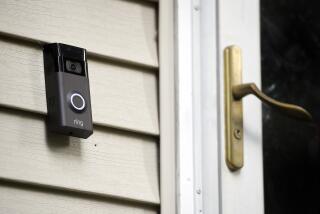Pacific Bell Hangs Up Its Offer on Caller ID : Telecommunications: The firm cites strict state privacy restrictions. Consumer groups hail the decision.
- Share via
Citing tough privacy protections imposed by state regulators, Pacific Bell said Tuesday that it will not offer Caller ID, a controversial service that allows customers to see a caller’s phone number on a special display screen.
The move makes California one of a handful of states without the new service. Pacific Bell, the state’s largest phone company, said regulations protecting the identity of unlisted phone numbers, which account for a whopping 40% of all households in the state, stripped the service of its profit potential.
Six months ago, GTE, which serves 3 million of the state’s 12 million telephone subscribers, also declined to offer the service for the same reasons.
Earlier this year, the state Public Utilities Commission ordered that subscribers with unlisted phone numbers automatically be given the right, free of charge, to block their numbers from being displayed on the Caller ID system. Customers with listed numbers could choose whether or not to block display of their numbers.
The phone companies had sought less-stringent restrictions that would have required subscribers to enter a special code each time they placed a call to block display of their number.
“No other state has required that phone companies give customers line blocking automatically,” said John Gueldner, Pacific Bell’s vice president for regulatory matters.
Gueldner explained that allowing a substantial number of households to block display of their numbers severely eroded the value of a Caller ID program. Few customers, he said, would be willing to pay $6 per month for a service that displayed the numbers of just a fraction of callers.
“We are disappointed not just for this service but because the regulators’ position shows that a new service with a high degree of public controversy will have a difficult time getting approval,” Gueldner said, alluding to future services the phone companies hope to offer over their networks. “We think it’s going to be tough for us as we roll out the Information Age.”
Consumer groups and privacy advocates hailed the phone company’s decision, saying it means phone customers won’t have to worry about a privacy-threatening service.
“The announcement is a relief,” said Thomas Long, an attorney with Toward Utility Rate Normalization, a San Francisco consumer group. “Customers will no longer have to worry about taking extra steps to protect the privacy of their telephone numbers.”
However, analysts caution that Pacific Bell may only be temporarily abandoning its efforts to offer the service and may be hoping that federal regulators will approve less restrictive rules in the future. Gueldner gave credence to this position, saying that Pacific Bell’s decision is not necessarily final.
“We’re not saying never,” he said. “But at least for the time being, there will be no Caller ID in California.”
In at least two other states--Arizona and Colorado--state regulators eased their policies after the local phone companies refused to offer Caller ID under their initial restrictions. Pacific Bell petitioned California regulators to modify their regulations, but last month the commission offered only a slight easing of restrictions originally announced in June.
Congress considered legislation this year establishing minimum federal privacy standards for Caller ID programs far less restrictive than those adopted in California. However, the legislation died at the end of the session and would have to be reintroduced to be considered again.
Pacific Bell said it would go ahead with plans to offer in March three other services--Call Trace, Call Screen and Call Return--to help people avoid unwanted calls and return missed calls.
Call Trace would permit subscribers to automatically trace a disturbing or threatening call.
Call Screen would reject calls from as many as 10 pre-programmed phone numbers that subscribers want to block. Calls from those numbers do not ring through and callers hear this prerecorded message: “We’re sorry, the party you are calling is not accepting this call.”
Call Return would let subscribers automatically return the last call received whether or not the call was answered.
More to Read
Inside the business of entertainment
The Wide Shot brings you news, analysis and insights on everything from streaming wars to production — and what it all means for the future.
You may occasionally receive promotional content from the Los Angeles Times.










